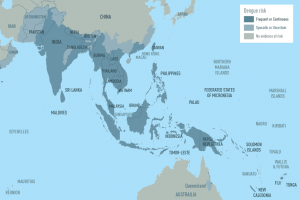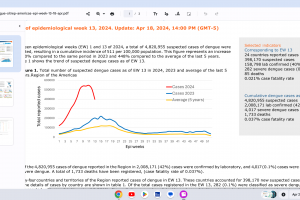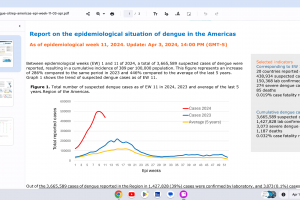Florida Travel Vaccines
Florida Vaccines 2024
The Florida Department of Health (FDH) updated its Vaccine-Preventable Diseases Surveillance Report in March 2024. FDH says although vaccinated individuals can still become infected with diseases, in general, those who have been immunized have less severe outcomes than those who have never been vaccinated. FDH published its Arbovirus Surveillance update #15 on April 13, 2024, disclosing mosquito-borne diseases, including West Nile virus disease, Eastern equine encephalitis, St. Louis encephalitis, chikungunya, dengue fever, malaria, yellow fever, West Nile virus, RSV, and Rift Valley fever.
Florida has confirmed that 14 species of Anopheles mosquitoes transmit diseases to humans. Florida issued a mosquito-borne illness advisory in March 2024, confirming Pasco County is currently under a mosquito-borne illness advisory. Furthermore, Broward, Escambia, Hardee, and Miami-Dade counties are presently under a mosquito-borne illness alert.
Florida Vaccination Requirements
As of April 2024, the state of Florida, the U.S. Centers for Disease Control and Prevention (CDC), Canada, and the United Kingdom have not issued any vaccination requirements for visitors to Florida. The U.S. Department of State and the U.S. Transportation Services Administration (TSA) have not issued any safety advisories for Florida in 2024.
Florida Disease Outbreaks
Alge Bllom - The Florida Department of Health in Miami-Dade lifted the health alert issued on December 2, 2022, of harmful blue-green algal toxins in the Coral Gables Canal - East Side. Follow-up water samples from the Department of Environmental Protection did not detect algal toxins. However, blue-green algae blooms can move around or subside and then reappear when conditions are favorable again. Therefore, residents and visitors are advised to avoid contact with the water if blooms are observed. The latest sample results can be viewed on ProtectingFloridaTogether.gov.
Chikungunya - Three chikungunya cases with onset in 2024 have been reported in individuals with a travel history to Brazil. Florida counties reporting chikungunya cases were Broward, Orange, and Pinellas. Four cases with onset in 2023 were reported in Florida by an individual with a travel history to chikungunya-endemic areas two weeks before onset. In 2022, one travel-associated chikungunya fever case was reported in Florida.
Dengue Fever - In 2024, 106 travel-associated dengue cases were reported, mainly by visitors from Cuba. In 2023, 609 travel-associated dengue cases were reported, primarily in people arriving from Brazil and Cuba. Five cases of locally acquired dengue were reported from two Florida counties in 2024. In 2023, 186 humans were reported from five Florida counties to have locally contracted dengue.
Eastern Equine Encephalitis virus—In 2023, two humans' positive samples were reported. The Florida Department of Health in Polk County (DOH-Polk) advised residents that there has been an increase in mosquito-borne disease activity in Polk County.
Everglades Virus - Spillover of Everglades virus (EVEV) to humans and dogs has been recorded since the 1960s. In 2022, positive samples from 72 sentinel chickens and 11 horses were reported from 24 counties. In 2023, positive samples from six sentinel chickens and two horses were reported from five counties.
Leprosy - According to the National Hansen's Disease Program, 159 new cases were reported in the United States in 2020. Central Florida, in particular, accounted for 81% of patients reported in Florida and almost 20% of nationally reported cases. The CDC said in July 2023 that there is some support for the theory that international migration of persons with leprosy is a potential source of autochthonous transmission.
Malaria - In 2024, nineteen cases of malaria with onset in 2024 have been reported in individuals with a travel history to a malaria-endemic area, such as Africa. In 2023, seven locally acquired malaria cases were reported in DOH-Sarasota, and 78 malaria cases with onset in 2023 have been reported in individuals with a travel history to a malaria-endemic area, such as Nigeria. The U.S. CDC published a report on September 8, 2023 - Outbreak of Locally Acquired Mosquito-Transmitted Malaria.
Measles - The Florida Department of Health in Broward County confirmed that about nine measles cases occurred in early 2024.
Mpox - Since the beginning of 2023, Florida has identified 38 cases of mpox across 12 counties. Florida counties have an elevated risk for outbreaks, led by Duval County at 57%, and Hillsborough and Palm Beach counties have a 52% risk of mpox outbreaks.
Respiratory Syncytial Virus - The Florida Department of Health segmented reports into five RSV regions. As of April 2024, RSV activity in Florida was decreasing.
West Nile Virus - In 2023, positive samples were confirmed from seven humans. In 2022, WNV-positive samples from six humans, five horses, 463 sentinel chickens, and eight mosquito pools have been reported from 27 counties. There were 10 cases of West Nile virus in Florida in 2021.





